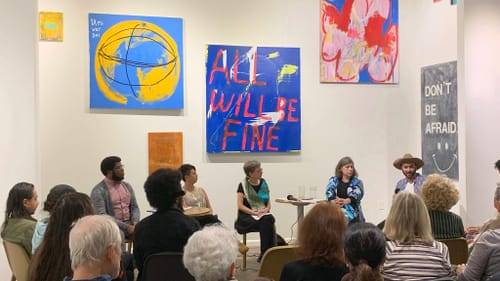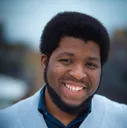Stay in the Loop
BSR publishes on a weekly schedule, with an email newsletter every Wednesday and Thursday morning. There’s no paywall, and subscribing is always free.
Responsibility is a practice
At year's end, we face reality: what comes next is our choice. Buckle up.

The holidays are grand but fleeting. Halloween dies a definitive death on November 1. Gratitude gives way to the crowds on Black Friday. The day after Christmas is a quiet drowning in the aftermath of giftwrap, garland gone astray, and lingering social hangovers. It’s like nothing lasts after the celebration. Was it even a celebration?
It’s not news, but the element of tradition has been blanched from the season. And you know what else comes and goes just the same? Election Day.
On the eve of the election
The evening before Halloween this year, I moderated a panel on activism and advocacy at FRIEDA in Old City. Before we got started, I spoke with a few people in the audience about the Working Families Party buzz ahead of the following Tuesday’s general election.
What made this party, and the election that brought it to City Hall, feel different? Was it just my own perspective, or was I catching the vibrations underscoring Philadelphia, a city in transition that has struggled with its identity?
On my October 30 panel was Diane Lu, a city planner and outreach strategist for the Germantown Info Hub; Mirele Goldsmith, the director of the Jewish Greening Fellowship in New York; Cathryn Miller-Wilson, the executive director of HIAS Pennsylvania, and Sheldon Omar-Abba, a documentary photographer based in North Philly.
While they all came from different walks of life, they had something in common: none of them had expected that their work would have such significant impact on their communities. Now, as activists and/or advocates, they are leaders with acute experience.
My takeaway from the panel was not only that I, too, have a responsibility, but also that I am responsible for particular causes, experiences, and communities. That’s not an overnight revelation, either, because responsibility is a practice.
Agency—not just for now
Let’s dial back for a second. When we think about responsibility, another term that comes to mind is agency. Mustafa Emirbayer and Ann Mische define “agency” in the American Journal of Sociology as a temporally embedded process of present social engagement informed by the past and oriented toward the future. Agency lets us analyze our responses to current events based on our past experiences, contextualizing our actions’ impact on those events, and imagining what possibilities, therefore, exist in the future.
I grew up in a working-class neighborhood, and politics never seemed to be part of my existence. My sixth-grade teacher talked about running for office (he’d later work for the Department of Homeland Security), and there was that one time Bill Clinton came to Big George’s Diner on 52nd Street. Other than that, I had little interaction with politics and I never thought they were for me. For us.
Until the 2008 election. That’s when the tide shifted, but it wasn’t until the latter part of the Obama administration that I noticed how the contemporary political climate impacted me and the neighborhood I’d grown up in.
That’s only the beginning, though.

When grand gestures fail
According to a piece over at Vox by P.R. Lockhart, the results from the Black Census Project survey reveal that while Black Americans were politically engaged and concerned about a variety of issues (including healthcare, economic divides, and gun violence), “a majority of black respondents said they don’t feel like politicians and political parties care about them. And those involved in putting the Black Census Project together say that feeling is reinforced by the fact that candidates’ efforts to engage Black communities often focus more on symbolic gestures than meaningful interactions.”
Gestures are problematic enough. They come with the expectation of a positive reaction while bypassing interaction and deep interpersonal engagement. They largely disregard what the other parties want. A grandly executed marriage proposal puts pressure to say yes. Is a grand political gesture any different? If President Clinton is eating fried chicken and playing saxophone at a local diner (that permanently closed not long after) and we’re facetiously anointing him as “the first Black president” like many cavalierly did in the 90s, we’re saying yes because he made that gesture, not because Clinton recognized his own agency and responsibility for an impoverished community.
Leading with little example
Alexa Ura illuminated Julián Castro’s presidential campaign in a piece for the Texas Tribune last summer. Castro, who grew up with a grandmother who arrived in the US from Mexico at age seven, after her parents had died, axiomatically maintains that immigration is an “obvious issue.” However, he has to be measured in his responses to questions about his identity. As Ura points out, Castro fields questions that only a Latino candidate would get, like extra scrutiny about why immigration policy is central to his platform.
It leaves him and other candidates from marginalized backgrounds “navigating the thin line between not being defined by their race or ethnicity while honoring what it means for someone who looks like them to be running.”
We didn’t have politicians with visibility like Castro, Obama, Alexandria Ocasio-Cortez, or even Andrew Yang when I was coming up. What were obvious issues for me were forsaken ones. Grand gestures don’t even begin the path to fixing disenfranchisement. Finding understanding and resolution of political concerns close to home can be a desultory, lonely experience that yields few, if any, answers—or worse, the wrong ones.
What we really need
I need Election Day, and the tradition of politics and beyond, to last more than just a day. Otherwise, developing and executing my own agency and responsibility is going to become a broken, staggered, fleeting practice. I can’t depend on others to make that happen—that’s my responsibility.
By no means am I a politician, nor have I ever wanted to be. I don’t want to call myself an advocate or an activist—we can’t just adopt those titles for ourselves. They must be given, earned. What I will say is that, based on my past experiences, I can write. As an editor in the present, I can curate stories for a platform that elevates previously unheard voices. And in the future, I can project alternative possibilities that will beget opportunity, clarity, and power for others that I have a responsibility to help.
We don’t need grand gestures or bestowed titles to lead. We just need to know who we want to lead, why, and how. That takes practice.
Want more? Here's BSR editor-in-chief Alaina Johns's take on a failure of journalistic responsibility.
Sign up for our newsletter
All of the week's new articles, all in one place. Sign up for the free weekly BSR newsletters, and don't miss a conversation.
 Kyle V. Hiller
Kyle V. Hiller